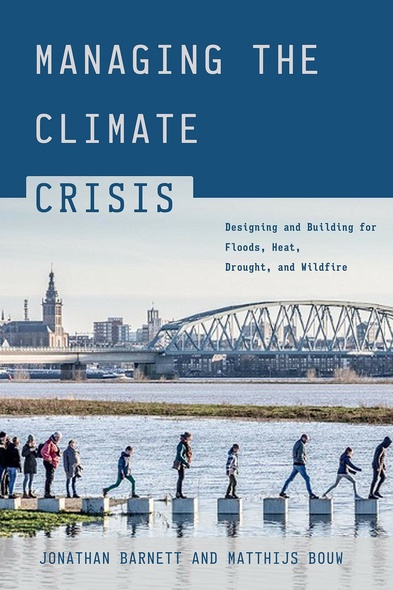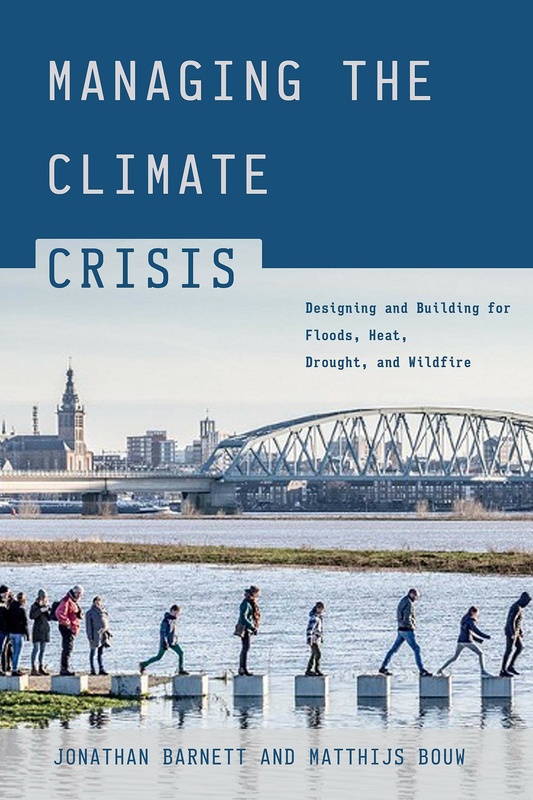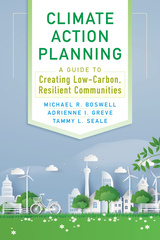Managing the Climate Crisis
Designing and Building for Floods, Heat, Drought, and Wildfire
By Jonathan Barnett and Matthijs Bouw
Island Press
The climate, which had been relatively stable for centuries, is well into a new and dangerous phase. In 2020 there were 22 weather and climate disasters in the United States, which resulted in 262 deaths. Each disaster cost more than a billion dollars to repair. This dangerous trend is continuing with unprecedented heat waves, extended drought, extraordinary wildfire seasons, torrential downpours, and increased coastal and river flooding. Reducing the causes of the changing climate is the urgent global priority, but the country will be living with worsening climate disasters at least until midcentury because of greenhouse emissions already in the atmosphere. How to deal with the changing climate is an urgent national security problem affecting almost everyone.
In Managing the Climate Crisis, design and planning experts Jonathan Barnett and Matthijs Bouw take a practical approach to addressing the inevitable and growing threats from the climate crisis using constructed and nature-based design and engineering and ordinary government programs. They discuss adaptation and preventive measures and illustrate their implementation for seven climate-related threats: flooding along coastlines, river flooding, flash floods from extreme rain events, drought, wildfire, long periods of high heat, and food shortages.
The policies and investments needed to protect lives and property are affordable if they begin now, and are planned and budgeted over the next 30 years. Preventive actions can also be a tremendous opportunity, not only to create jobs, but also to remake cities and landscapes to be better for everyone. Flood defenses can be incorporated into new waterfront parks. The green designs needed to control flash floods can also help shield communities from excessive heat. Combating wildfires can produce healthier forests and generate creative designs for low-ignition landscapes and more fire-resistant buildings. Capturing rainwater can make cities respond to severe weather more naturally, while conserving farmland from erosion and encouraging roof-top greenhouses can safeguard food supplies.
Managing the Climate Crisis is a practical guide to managing the immediate threats from a changing climate while improving the way we live.
In Managing the Climate Crisis, design and planning experts Jonathan Barnett and Matthijs Bouw take a practical approach to addressing the inevitable and growing threats from the climate crisis using constructed and nature-based design and engineering and ordinary government programs. They discuss adaptation and preventive measures and illustrate their implementation for seven climate-related threats: flooding along coastlines, river flooding, flash floods from extreme rain events, drought, wildfire, long periods of high heat, and food shortages.
The policies and investments needed to protect lives and property are affordable if they begin now, and are planned and budgeted over the next 30 years. Preventive actions can also be a tremendous opportunity, not only to create jobs, but also to remake cities and landscapes to be better for everyone. Flood defenses can be incorporated into new waterfront parks. The green designs needed to control flash floods can also help shield communities from excessive heat. Combating wildfires can produce healthier forests and generate creative designs for low-ignition landscapes and more fire-resistant buildings. Capturing rainwater can make cities respond to severe weather more naturally, while conserving farmland from erosion and encouraging roof-top greenhouses can safeguard food supplies.
Managing the Climate Crisis is a practical guide to managing the immediate threats from a changing climate while improving the way we live.
[Managing the Climate Crisis] melds both into a discussion of adapting human construction to withstand the throes of climate change, and is written by two design and planning experts who examine not just structural choices, but the political policies guiding urban and environmental design....Libraries strong in urban design and planning, climate change analysis, and adaptation for future health and safety will find the practical, wide-ranging approach of Managing the Climate Crisis to be satisfyingly specific.’
This would be a useful resource for someone deciding where to live and work, and it should be a handbook for municipal planners making short- and long-term decisions....Summing Up: Highly recommended. All readers.
With the climate crisis already at our doorsteps, Barnett and Bouw focus on tools readily available to us as they offer real-world solutions to the world’s growing environmental challenges. Their winning approach to problem solving makes wise use of current government programs, tried-and-true nature-based design principles, smart engineering, and solid construction techniques to safeguard communities and offer hope for a more resilient future.
Using cutting-edge examples, Managing the Climate Crisis offers a structured guide for building resilience. This book puts the costs and benefits of dealing with pressing climate challenges into high relief, and will empower anyone who reads it to make better, bolder decisions to safeguard our collective future.
This impressive and wide-ranging book provides a compelling set of principles, policies, and designs. The description of US and international communities that have acted should inspire us, while the suggested policies provide a pragmatic roadmap to help others get there. I highly recommend Managing the Climate Crisis, whether you are a government official looking to learn from others, a practicing landscape architect or planner tasked with creating resilient design strategies, or a faculty member who is teaching the next generation about this existential threat.
Jonathan Barnett is a Fellow of the Penn Institute for Urban Research, Professor Emeritus of City and Regional Planning, and former director of the Urban Design Program at the University of Pennsylvania. He is the author of Designing the Megaregion: Meeting Urban Challenges at a New Scale, and, with Larry Beasley, of Ecodesign for Cities and Suburbs, as well as many other books and articles about city and regional design.
Matthijs Bouw is a Professor of Practice in Architecture and Landscape Architecture and the McHarg Center Fellow for Risk and Resilience at the University of Pennsylvania. He is also a founder of One Architecture & Urbanism, an award-winning architecture and planning firm, established in 1995, with main offices in New York City and Amsterdam. His projects in the U.S. include continuing planning work for Climate-Ready Boston and climate-resilience plans for New York City.
Matthijs Bouw is a Professor of Practice in Architecture and Landscape Architecture and the McHarg Center Fellow for Risk and Resilience at the University of Pennsylvania. He is also a founder of One Architecture & Urbanism, an award-winning architecture and planning firm, established in 1995, with main offices in New York City and Amsterdam. His projects in the U.S. include continuing planning work for Climate-Ready Boston and climate-resilience plans for New York City.
PART 1: UNDERSTANDING THE CLIMATE CRISIS
CHAPTER 1: The Climate Crisis: A National Security Problem
CHAPTER 2: The Causes and Dangers of a Warming Climate
PART II: MANAGING CLIMATE THREATS
CHAPTER 3: Flooding from Sea Level Rise and Storm Surges
CHAPTER 4: Flooding along Rivers
CHAPTER 5: Flooding from Extreme Storm Events
CHAPTER 6: Life-Threatening Heat
CHAPTER 7: Shortages of Fresh Water
CHAPTER 8: Wildfire
CHAPTER 9: Food Shortages
PART III: LOOKING AHEAD
CHAPTER 10: Recent Progress in Managing Climate Threats
CHAPTER 11: Costs and Benefits of Managing Climate Threats
CHAPTER 12: How Managing the Climate Crisis Can Transform the United States
Acknowledgments
Illustration Credits
Notes
Index
About the Authors
CHAPTER 1: The Climate Crisis: A National Security Problem
CHAPTER 2: The Causes and Dangers of a Warming Climate
PART II: MANAGING CLIMATE THREATS
CHAPTER 3: Flooding from Sea Level Rise and Storm Surges
CHAPTER 4: Flooding along Rivers
CHAPTER 5: Flooding from Extreme Storm Events
CHAPTER 6: Life-Threatening Heat
CHAPTER 7: Shortages of Fresh Water
CHAPTER 8: Wildfire
CHAPTER 9: Food Shortages
PART III: LOOKING AHEAD
CHAPTER 10: Recent Progress in Managing Climate Threats
CHAPTER 11: Costs and Benefits of Managing Climate Threats
CHAPTER 12: How Managing the Climate Crisis Can Transform the United States
Acknowledgments
Illustration Credits
Notes
Index
About the Authors






